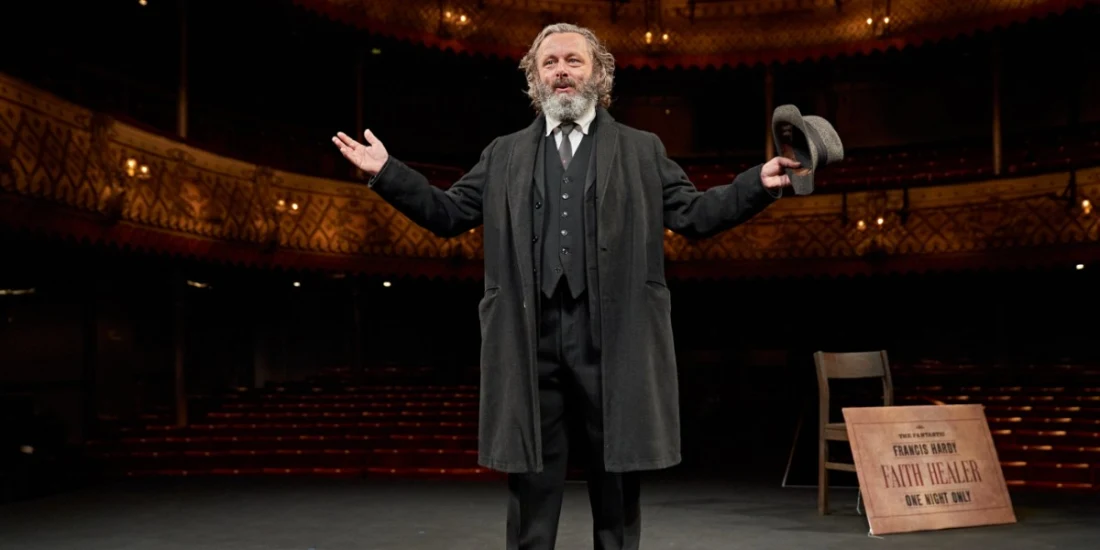Michael Sheen, David Threlfall, Indira Varma 'mesmerise' in Old Vic 'Faith Healer'
Social distancing? That would have been the last thing on your mind during the recent livestream from London's venerable Old Vic of Faith Healer, the ever-shifting and seismically intimate drama that was seen across four days as part of that playhouse's In Camera series of plays performed against an empty auditorium. (Their previous offering, the remarkable Three Kings with Andrew Scott, was seen just two weeks previously.)
Premiered on Broadway in 1979 where it did a fast fade, Brian Friel's play has since become a much-analyzed standard of the theatrical repertoire and remains one of the very few plays in English to be seen at all three of the Royal Court, Almeida, and Donmar, at different times and to very different results. (The Court iteration in 1992 was the first of the three and remains one of my desert island productions as led by Sinéad Cusack, Ron Cook, and the late and much-missed Donal McCann in the title role.)
Not to be outdone, the director Matthew Warchus's Old Vic trio brought Michael Sheen, Indira Varma and a cast-against-type David Threlfall to bear on an unusually restless account of the play that at times seemed to collapse the distance between audience and actor so thoroughly that we were all but swimming inside the characters' heads. (For that, blame the somewhat hyper camerawork.) But at its best, when the camera stepped back and let a trio of mesmeric actors find their own sinuous way into Friel's charged landscape, the play gripped and, come its final reckoning, chilled anew. The ceaseless torrent of language, presented without an interval on Rob Howell's changing sets, made this a greatly more demanding sit than either Three Kings or its predecessor, the Claire Foy/Matt Smith starrer, Lungs.
Friel's structure is at once simple and intricate: three characters speak four monologues. The "faith healer" of the title - Sheen's wild-haired Frank Hardy - bookending events that we sense early on will not and cannot end well. In between come reminiscences from Varma's Grace, who is either Frank's wife or his mistress depending upon the speaker, and his Cockney manager Teddy (Threlfall), an avid raconteur who has a weakness for Jerome Kern and has very possibly nursed a long passion for Grace himself. (Teddy is the nearest this deeply serious play offers to comic relief.)
Along the way come a catalog of grief, self-reproach, and death, the specifics of which get amended via a sequence of solo turns that is forever casting its own truths into doubt. Barely has the whiskey-drinking Frank mentioned his own father's passing as a mere afterthought before we come upon Grace, seated in a bedsit in London's Paddington and looking in Varma's blistering performance as if an inheld pain might cause her to crack wide open: her own father, a northern Irish judge, can't be nearly so easily dismissed from the memory. Revising Frank's story as she goes, Grace then passes the narrative baton to the avuncular Teddy who testifies to an ongoing rancor between Frank and Grace that seems, in the case of Grace especially, to have seeped deep under her skin.
Along the way, Friel teases out a meditation on the efficacy of the artist as perhaps little more than a glorified chancer, a conman whose own gifts are as wayward as that of the itinerant Frank, who recites the Welsh villages to which he and his tiny retinue have traveled as if the place names themselves were a sort of incantation. Welsh himself (though here playing an Irishman), Sheen is entirely at home with the rhetorical lushness of Friel's speech, and the actor's fulsome post-lockdown locks suggest a sort of Biblical patriarch roaring his way toward the grave.
Contrastingly delicate, Varma registers as the most moving Grace I have come across since Cusack nearly three decades ago, while Threlfall's rangy, physically capacious Teddy cuts an entirely different physical figure than most inhabitants of this role who tend to be small and compact (Tony winner Ian McDiarmid on Broadway in 2006 for one)i, like a devoted dog forever lapping at Frank and Grace's heels. Like Translations, a second Friel masterwork written during the same fertile period in this dramatist's life, humankind is revealed to march to a marauding and lethal drum that leaves devastation in its wake. That's the startling note on which Faith Healer ends, leaving an audience to savor the pungency of an artist, namely Friel, punchdrunk on words that in the end are powerless to forestall the psychic wilderness into which his characters must fall.
Faith Healer played at The Old Vic as part of the In Camera series 16-19 September.
Photo credit: Michael Sheen in rehearsal of Faith Healer (Photo by Manuel Harlan)
Originally published on
